If you know even a little about Cary’s founding and history, you know that Frank Page stands in the center of it. BUT you may be unfamiliar with the original town commissioners assembled by Frank Page in 1871. These five men helped Frank Page guide Cary through that momentous year to the first election of town commissioners in 1872. Here is an introduction to some known and some little-known names of Cary’s past.
Rufus Henry Jones (1819 – 1903)
Rufus Henry Jones was the son of Henry and Nancy Ann Jones and the grandson of Nathaniel Jones of White Plains (maternal lineage) and Nathaniel Jones of Crabtree (paternal lineage). His childhood home was the historic Nancy Jones House, still standing on Chapel Hill Road in Cary. He attended Hillsborough Academy (also known as the Bingham Academy) in 1839 to prepare for higher education, and he went on to graduate from the University of North Carolina in 1843. He started his own career in education by operating an early school in the Cary area in 1847. He also served on the Common School Committee of Examination, ensuring the quality of teachers in Wake County. In 1873, Rufus purchased a 1/3 interest in Cary Academy from Frank Page, who had started the school in 1870. In 1886, two of his daughters, Sarah and Loulie (Louise) purchased the remaining interest in the school, and the family owned the school until stockholders bought out the Jones family interest and incorporated the school in 1896. Rufus’ home on Academy Street was the impressive “Principal’s House”, which stood on the site of the current library green, near the Cary Arts Center.
.jpg)
Besides his own daughters Loulie and Lily who taught at the school, several members of the extended Jones family were also committed to education for local citizens. Nathaniel Jones of White Plains was a trustee of the early Raleigh Academy and Rufus’ brother Adolphus built a private school in 1867 that was known to have educated Walter Hines Page. Alfred D “Buck” Jones also supported the community by sponsoring an early school for African American students.
Jones followed in the footsteps of some of his Jones ancestors and developed an early interest in politics, serving in the House of Commons from Wake County in 1848 – 1849 and as a Wake County Commissioner. He is also noted for being the first elected mayor of Cary in 1872. He also participated in civic and religious activities throughout his life. He was a founding member and trustee of the Cary Methodist Church and was a long-time president and member of the Wake County Bible Society. As a businessman, he operated a short-lived tannery. At his death, his obituary noted that Rufus Jones “was held in the highest esteem by all the people of the county.” He died in 1903 and is buried in the family plot at Hillcrest Cemetery on land he and his wife Sarah Merritt Jones had given to the town in 1887. Being a member of one of the earliest and most influential families in the Cary area, and Methodist, it was natural for Frank Page to know and value Jones’ influence and talents in establishing the Town of Cary.
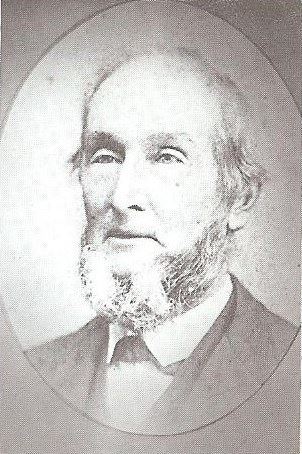
Rufus Henry Jones
Abram Haywood Merritt “AH” (1832 - 1913)
Abram or Abraham Haywood Merritt was born in Chatham County, NC in 1832. As did Rufus Jones, he studied at the Bingham School in Hillsborough and graduated from UNC in 1856. His teaching career started at Olin High School in Iredell County. At the start of the Civil War, he returned to his home in Chatham County and worked as Clerk and Master in Equity for the county, a position usually reserved for attorneys. In 1870, he was brought into the newly established Cary Academy as principal and teacher by his brother-in-law, Rufus H Jones, who was married to Merritt’s sister, Sarah Merritt Jones. Not only was Merritt the principal of the school that Frank Page built, but was also on the Board of Trustees of the Methodist Church, the church that Frank Page had a hand in founding and building. He also served on the executive committee of the Wake County Bible Society along with Frank Page and brother in law Rufus Jones After serving as an appointed town commissioner, he was in the first group of elected commissioners for the Town of Cary. Professor Merritt went on later to be in charge of the successful Pittsboro Academy in Chatham County and served for many years as the Superintendent of the Pittsboro United Methodist Church Sunday School. On the state level, Professor Merritt served as a three-term state senator. He served on the committee of education and libraries, demonstrating his commitment to education and was a leading proponent in the legislature of the temperance movement, which is no surprise, given his associations! He served as a trustee of the University of North Carolina as well as superintendent of public instruction in Chatham County. Although he didn’t seek the limelight, he was a sought-after speaker and used humor and his knowledge on a variety of subjects to be an entertaining and eloquent speaker. His literary skills served him well during his time as editor of the popular “The Pittsboro Home” weekly newspaper. He was described by a great-grandson as “a dreamer, educator, poet, and public servant.”Later in life, “AH” moved with his wife, Sarah Elizabeth Purvis Merritt, to Mount Airy to join one of his sons, who had successfully established himself in business there and had become a community leader. Both “AH” and his wife lived out their lives in Mount Airy and are buried there.
Mr Merritt is pictured below. He is the older gentleman in the middle of the photo, surrounded by his family.
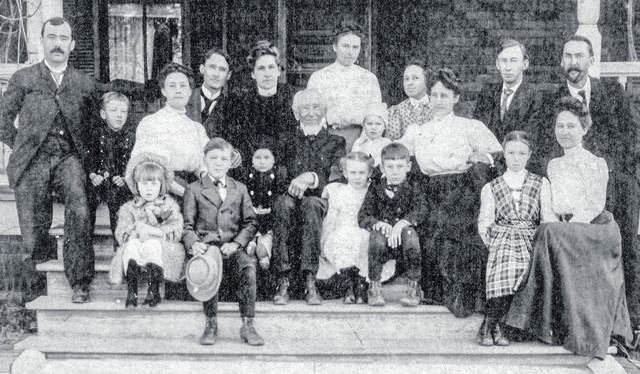
William Peter Mallett, MD (1819 – 1889)
W P Mallett was born in Fayetteville in 1819, the son of Charles Mallet, a Huguenot who had fled France following the revocation of the Edict of Nantes. He was educated in Fayetteville, his hometown and at Trinity College, Hartford, CT. From there he received his doctorate in medicine at the Medical College of Charleston, SC in 1841, practiced for several years in Tuscaloosa, AL and eventually returned home to set up his practice in Fayetteville and the surrounding Cumberland County area. In 1857 when his health declined, he moved to Chapel Hill so that his children could attend “the university”. While in Chapel Hill, he set up the first infirmary at UNC and practiced general medicine in the community and served as a physician at the university. Although his health never fully recovered, he continued to practice medicine throughout his life. As a doctor, he was known for his gentleness and studious nature. He was quiet, soft-spoken, confident and brought peace and an assurance of recovery to his patients.
He distinguished himself as a surgeon and in 1852 remarkably performing a caesarean section on a young mother, who survived to later have several children. This was one of the first recorded C-sections in the South. He insisted upon cleanliness (before germ theory was developed), using hot water and soap for both himself and his patients, even for minor surgical operations. He also promoted the treatment of fevers with fluids and appropriate diet, which was actually considered dangerous in its day. He kept abreast of the newest medical literature.
After the Civil War, he left Chapel Hill. He advertised to sell his property in Chapel Hill and in 1870 was “erecting some handsome buildings” in Cary. On the 1870 Census, his household is listed near the Rufus H Jones family.
We may assume that Frank Page and Dr Mallett met in Fayetteville. Frank Page’s wife Catherine Raboteau Page shared a Huguenot background and it is likely that paths crossed in Frank’s years in the timber business in Fayetteville before Page returned to Wake County after his marriage. Frank would have been familiar with Dr. Mallet’s fine character and the esteem granted him during his lifetime, making Dr Mallett a natural choice to help guide Cary in its early stages of development.
Dr Mallett died in 1889, working with patients up to the very end of his life. He was on his way to visit a patient when he suffered a heart attack. He was able to return home, but died the following day. He is buried in the Old Chapel Hill Cemetery.
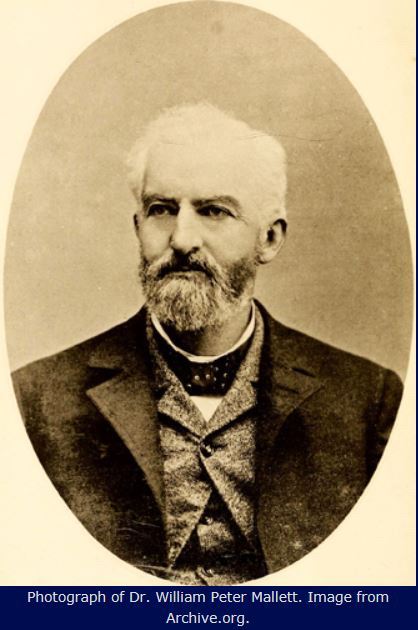
William Peter Mallett
Henry B Jordan (1834 – 1914)
Henry B Jordan was born in Wake Co, NC in 1834 to Calvin and Rebecca Bagwell Jordan. Calvin Jordan was a business owner in Raleigh from the late 1840s to 1858, when he moved with most of his family to western TN. Henry stayed behind to liquidate the business. With Calvin’s unexpected death shortly after arriving in Tennessee and the closing of the family business, Henry and his family moved to southeast Wake County near the Hollands Community where his wife Helen owned property. Henry and Helen were members of the Hollands Methodist Church and active members of the community. During the Civil War, Henry was in charge of the train that brought General William Tecumseh Sherman to Raleigh en- route to the Bennett House for surrender term talks with Confederate General Joseph E Johnston. Henry was also a temperance man, firmly believing in prohibition. It is unclear how Jordan became acquainted with Frank Page, but the two shared Methodism and a belief in the temperance movement. Perhaps Frank met Henry on one of his forays into Raleigh. The Jordan family moved to Cary shortly before its incorporation, and Henry became a member of the original slate of town commissioners. He was also a founding member and trustee of the Cary Methodist Church. What Henry lacked in higher education (he had a common school upbringing), he made up for in civic responsibility, being elected as a town commissioner in Cary’s first election in 1872, serving as mayor of Cary, as a justice of the peace, as an election judge and the Public School Committee member for the District #2 for the “colored race”. In this capacity, the commissioners bought land from Frank Gray, a businessman in Cary, for the school. Jordan also owned and operated a general store in Cary and worked as a railway agent and farmer. His home was located near the intersection of Harrison Avenue and West Chatham Street, near the former location of the Ivey-Ellington house. Henry had two children with his wife Helen George Crowder Jordan. His daughter Maggie Ida Jordan married a shopkeeper from Raleigh, Robert E Ellis. One of their daughters was Miss Irma Ellis, a long-time 1st grade teacher in Cary. Miss Irma remembers her grandfather Henry taking her to visit Bennett Place and hearing the Civil War story directly from him. Henry’s son was James B Jordan, who worked as a logger/timberman and later as a Deputy US Marshall. He was shot twice in the line of duty breaking up stills (a man after his father’s heart) and eventually died in poor health caused by his wounds. Henry, wife Helen and son James B Jordan are all buried in Hillcrest Cemetery in Cary. Robert, Maggie and Miss Irma Ellis are buried in Oakwood Cemetery in Raleigh.
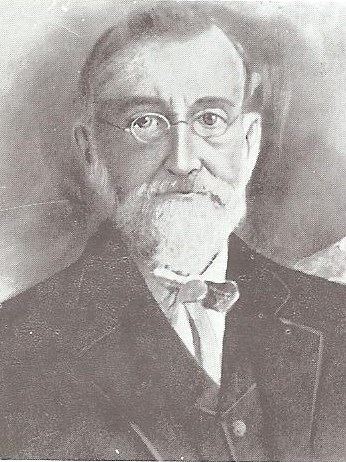
Henry B Jordan
William H Bobbitt
Rev William Hilliard Bobbitt, DD was born in Halifax Co, NC in 1826. After joining the Methodist Episcopal Church at an early age, and in 1846, he joined the North Carolina Conference, which was the umbrella organization for Methodist churches in the state. He actively ministered for 44 years, mainly in North Carolina. Although he didn’t reside in or pastor the Methodist Church in Cary, he served in the Raleigh District for several years. He suffered a stroke near the end of his life which ended his ministerial duties, and he died in 1890. He is buried in Salisbury, NC. His younger brother, Rev James Burrows Bobbitt served the Methodist Church in many capacities, and published “The Raleigh Christian Advocate”, the newspaper of the North Carolina Conference.
It is well known that Frank and Catherine Page were ardent Methodists and would have known Rev Bobbitt. According to a newspaper clipping from “The Raleigh Christian Advocate” in 1870, Rev Bobbitt appointed A H Merritt, among others, to prepare Sunday School lessons to be published in “The Raleigh Episcopal Methodist” for distribution and use. This connection between Rev Bobbitt and A H Merritt underscores the familiarity of the commissioners with each other. As a matter of fact, Rev Bobbitt performed the marriage ceremony of Mr Merritt and his bride, Sarah Elizabeth Purvis. When the Cary church was made the Methodist circuit headquarters for this section of NC in 1873, Rev Bobbitt was the Presiding Elder and held the District Conference in Cary the same year. This meeting must have been one of the first important meetings held in the newly formed town. He returned to Cary in 1884 for a Methodist revival, “with the gratifying result of forty persons converted”.
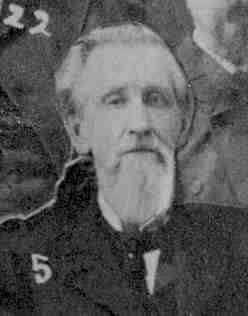
William H Bobbitt
Frank Page was an astute businessman who selected men of character and ability to join him in building the Town of Cary. Each man brought skills that reinforced the qualities that were important to Mr Page: education, high moral character, and business opportunities, as seen in the lives of the five men who joined Page to put Cary on the map. There was a minister, educator, physician, businessman, and political figure. It’s said that behind every successful man is a strong woman, and that is the case with Frank Page and his wife, Catherine. BUT Frank Page also had five strong men with him who helped get the Town of Cary started on the right foot!
